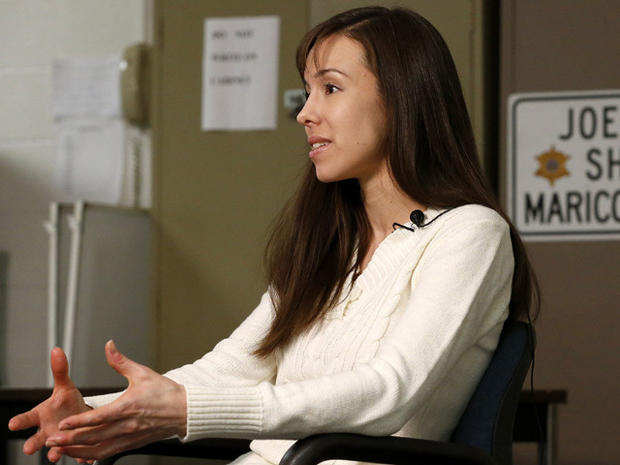Jodi Arias Update: Defense attorneys ask judge to rule out death penalty option
(CBS/AP) PHOENIX - Jodi Arias' attorneys have asked a judge to vacate the jury's decision in her murder trial that the 2008 killing of her boyfriend was "especially cruel," a finding that allowed the panel to consider the death penalty.
PICTURES: Jodi Arias pleads with jurors for a life sentence
Defense attorneys argue in their motion that the definition of "especially cruel" is too vague for jurors with no legal experience to determine what makes one killing more cruel or heinous than another.
The filing also appears to challenge a landmark 2002 U.S. Supreme Court ruling that found a defendant has the right to have a jury, rather than a judge, decide on the existence of an aggravating factor that makes the defendant eligible for capital punishment.
The high court determined that allowing judges to make such findings violated a defendant's constitutional right to a trial by jury.
"Given the apparent difficulties that judges faced (prior to the ruling) in applying the statute in a uniform, consistent manner, juries are understandably even less equipped to do so," defense attorney Kirk Nurmi wrote in the motion filed late last week.
Arias was convicted of first-degree murder May 8 in the stabbing and shooting death of Travis Alexander in his suburban Phoenix home. About two weeks later, the same jury failed to reach a unanimous decision on whether to sentence Arias to life in prison or death.
Nurmi argues the term "especially" when coupled with cruel, heinous or depraved in a murder case, was first used when judges had the authority to determine factors that could make a defendant eligible for the death penalty, before the 2002 Supreme Court ruling.
"By including the word `especially', the statute was designed to be employed by a judge, one presumed to have the depth and breadth of experience to identify those first degree murders `above the norm,"' he wrote.
Nurmi added that under current law, "layperson jurors" are left to "muddle through" the definition, with a defendant's life in the balance.
Maricopa County Attorney Bill Montgomery called the motion a standard procedural move.
"Those are defense attorneys doing their job advocating for their client," Montgomery said Wednesday. "Obviously, we disagree."
The defense motion was filed as prosecutors are preparing to pursue the ultimate punishment again in a second penalty phase with a new jury. Arias' murder conviction will stand. Prosecutors also have the option of taking the death penalty off the table and avoiding another sentencing trial, meaning Arias would be sentenced to life in prison.
Taxpayers footed the bill for Arias' court-appointed attorneys throughout her nearly five-month trial at a cost so far of nearly $1.7 million, a price tag that will only balloon if the case moves forward.
Montgomery has declined to publicly release the cost his office incurred prosecuting the case, citing a court order that seals some, but not all, materials involved in the trial. The county, meanwhile, has provided regular updates on Arias' defense costs.
Regardless, Montgomery said the cost to taxpayers will play no role in whether prosecutors decide to resolve the case without another trial, or move forward with seating a new jury in an effort to secure a death sentence. That lengthy process would involve reintroducing testimony and evidence to bring the fresh panel up to speed.
The next hearing in the case is set for July 18.
Complete coverage of the Jodi Arias case on Crimesider

